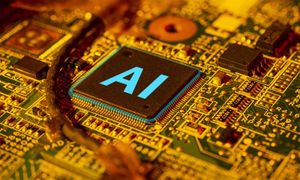
Charlottesville, VA – November 5, 2025 – In a landmark collaboration set to accelerate artificial intelligence innovation and talent development, the University of Virginia (UVA) School of Engineering and Applied Science and Capital One (NYSE: COF) have announced a $4.5 million partnership. Unveiled on October 27, 2025, this strategic alliance aims to establish a dedicated AI research neighborhood and a Ph.D. fellowship program, positioning UVA as a critical hub for advanced AI research with a strong emphasis on financial technology.
The initiative represents a significant investment in the future of AI, bringing together academic rigor and industry expertise to tackle some of the most complex challenges in machine learning, data analytics, and responsible AI development. This partnership underscores Capital One's commitment to leveraging cutting-edge technology to redefine financial services and cultivate a pipeline of next-generation AI leaders.
A New Era of Academic-Industry AI Collaboration: Technical Depth and Distinguishing Features
The cornerstone of this collaboration is the establishment of the "Capital One AI Research Neighborhood," a sprawling 31,000-square-foot facility within UVA Engineering's forthcoming Whitehead Road Engineering Academic Building. This state-of-the-art hub will serve as the epicenter for AI research at UVA, uniting over 50 AI researchers from various departments to foster interdisciplinary breakthroughs. The partnership also includes a $500,000 allocation from Capital One for the "Capital One Ph.D. Fellowship Awards," designed to support doctoral students engaged in frontier AI research.
Technically, the research agenda is ambitious and highly relevant to modern AI challenges. It will delve into advanced machine learning and data analytics techniques, behavioral design systems for understanding and influencing user interactions, robust cyber systems and security, and model-based systems engineering for structured AI development. A core focus will be on addressing pressing industry challenges such as scaling AI systems for enterprise applications, orchestrating complex data management at scale, and advancing state-of-the-art, real-time AI experiences. The Ph.D. fellowships will specifically target areas like trustworthy machine learning, generative AI, computer vision, causal inference, and integrative decoding for reliable Large Language Model (LLM) reasoning in financial services.
This partnership distinguishes itself from previous academic-industry models through several key aspects. Unlike traditional sponsored projects or smaller grants, the creation of a dedicated physical "AI Research Neighborhood" represents a profound, embedded integration of corporate and academic research. The substantial, matched investment ($2 million from Capital One, $2 million from UVA for the facility, plus fellowship funding) signifies a long-term, strategic commitment. Furthermore, this initiative builds upon Capital One's existing relationship with UVA, including the Capital One Hub for UVA's School of Data Science and support for the UVA Data Justice Academy, indicating an expanding, comprehensive approach to talent and research development. The explicit emphasis on "well-managed and responsible AI development" also sets a high bar for ethical considerations from the outset.
Initial reactions from the AI research community have been largely positive, hailing the partnership as a "strategic investment in AI education" that could "reshape how AI is integrated into both academic and corporate spheres." However, some experts have raised "potential risks and ethical considerations" regarding the blurring of lines between corporate interests and academic research, emphasizing the importance of maintaining "ethical standards and academic integrity" to prevent research priorities from being overly skewed towards immediate commercial applications.
Reshaping the AI Industry Landscape: Competitive Implications and Market Shifts
The UVA-Capital One AI research partnership is poised to send ripples across the AI industry, creating both opportunities and competitive pressures for established tech giants, emerging startups, and particularly other financial institutions. Capital One, by cultivating advanced in-house research capabilities and securing a pipeline of specialized AI talent, is strategically enhancing its position as a "tech company that does banking."
Other financial institutions, such as JPMorgan Chase (NYSE: JPM), Citigroup (NYSE: C), and Bank of America (NYSE: BAC), especially those without comparable deep academic AI partnerships, may face increased pressure to innovate their own AI capabilities. Capital One's advancements in areas like personalized financial products, fraud detection, and operational efficiency, stemming from this collaboration, could set new industry benchmarks, compelling competitors to accelerate their AI transformation efforts. Fintech companies and startups that primarily differentiate themselves through AI innovation might find it challenging to compete with Capital One's internally developed, bespoke AI solutions.
Conversely, the partnership could create opportunities for specialized AI tool and platform providers. Companies offering niche technologies that complement the research domains—such as advanced cybersecurity platforms, data governance tools compatible with large-scale financial data, or ethical AI framework development tools—might find new integration opportunities or increased demand for their products. Tech giants like Google (NASDAQ: GOOGL), Amazon (NASDAQ: AMZN), and Microsoft (NASDAQ: MSFT), which provide foundational AI tools and cloud infrastructure, could see benefits if the research yields advancements that foster broader adoption and utilization of their platforms.
The potential disruptions to existing products and services are significant. Enhanced research in machine learning, data analytics, and behavioral design could lead to hyper-personalized financial products and real-time customer service, challenging traditional banking models. Advancements in cyber systems security and model-based systems engineering will likely result in more sophisticated fraud detection and risk assessment, making Capital One's products inherently safer. Furthermore, the partnership's focus on scaling AI systems and complex data management promises increased operational efficiency, potentially leading to cost advantages that could be passed on to customers or reinvested. The direct fostering of AI talent through Ph.D. fellowships also gives Capital One a distinct advantage in attracting and retaining top AI expertise, potentially exacerbating the existing talent shortage for other companies.
Broader Significance: AI Trends, Ethical Debates, and Future Benchmarks
This partnership is more than just a corporate-academic alliance; it is a microcosm of several broader trends shaping the AI landscape. It exemplifies the shift towards applied AI and industry-specific solutions, moving beyond foundational research to tackle tangible business problems. The emphasis on talent development through dedicated Ph.D. programs directly addresses the burgeoning demand for skilled AI professionals, positioning academic institutions as crucial incubators for the AI-ready workforce. It also highlights the growing trend of long-term, multi-sector partnerships where corporations deeply integrate their interests into academic research, acknowledging that complex AI challenges require diverse resources and perspectives.
Crucially, the partnership's commitment to "well-managed and responsible AI development" aligns with the increasing global awareness and demand for ethical considerations in AI design, deployment, and governance. This focus is particularly vital in the sensitive financial services sector, where issues of data privacy, algorithmic bias, and discriminatory treatment carry significant societal implications. While promising, this integration of corporate funding into academic research also sparks ethical debates about potential shifts in research priorities towards commercial interests, potentially sidelining fundamental or exploratory research without immediate market value. Ensuring continuous monitoring and robust ethical frameworks will be paramount to navigate these challenges.
In the grand tapestry of AI milestones, this partnership is not a singular "breakthrough" like the advent of deep learning or AlphaGo. Instead, it represents an evolution in how academic and industrial entities converge to advance AI. Historically, AI research was largely academic, but as its commercial potential grew, industry involvement deepened. Capital One's approach is part of a broader strategy, as evidenced by its support for the UVA School of Data Science, the NSF AI Institutes, and collaborations with other universities like Columbia, USC, and UIUC for responsible and generative AI safety. This comprehensive, embedded approach, particularly with its dedicated physical research neighborhood and specific focus on financial services, distinguishes it from more transactional collaborations and positions it as a significant model for future academic-industry engagements.
On the Horizon: Expected Developments and Expert Predictions
In the near term, the immediate focus will be on operationalizing the Capital One AI Research Neighborhood, bringing together its cadre of researchers, and launching the Ph.D. Fellowship Awards program. Initial research will delve into the core areas of machine learning, data analytics, behavioral design, cyber systems, and model-based systems engineering, with an emphasis on tackling real-world problems such as scaling AI for enterprise applications and orchestrating complex data at scale. Educators will also immediately benefit from new facilities, funding, and opportunities to integrate industry-relevant questions into their curricula.
Looking further ahead, the long-term vision is to establish a nationally important talent pipeline for the AI-ready workforce, continuously advancing AI research critical to the future of financial services. This includes improving AI's ability to understand human emotions and respond appropriately to build trust. The collaboration is expected to foster extensive cross-disciplinary work, pushing forward advances in data science, AI automation, human-centered design, and data-driven decision-making to create intelligent infrastructure. Ultimately, this partnership aims to set a precedent for how industry and academia can collaboratively develop AI technologies responsibly and equitably.
Potential applications and use cases are vast, ranging from enhanced customer experiences through real-time, intelligent interactions and hyper-personalized financial products, to superior fraud detection and risk management leveraging advanced graph-language models. Research into fairness-aware AI could lead to more inclusive financing policies, while advancements in data management and cybersecurity will bolster the resilience and efficiency of financial systems.
However, significant challenges remain. Ethical and regulatory questions concerning data privacy, algorithmic bias, and the potential for AI to influence human choice will need continuous scrutiny. The rapid pace of AI evolution means regulatory frameworks often lag, necessitating a proactive role from institutions like UVA in shaping policy. Maintaining academic independence against commercial pressures and ensuring the development of inherently trustworthy, capable, and context-aware AI are paramount. Experts like Dr. Prem Natarajan, EVP, Chief Scientist, and Head of Enterprise AI at Capital One, emphasize a shared commitment to driving innovations that deliver value to people while ensuring a broad range of expertise and perspectives. Todd Kennedy, EVP at Capital One and a UVA Engineering Board Member, expressed excitement for the organizations to "help pave the way to thoughtfully shape the future of AI in academia, industry, and society more broadly."
A Comprehensive Wrap-Up: Significance and Future Watch
The $4.5 million partnership between UVA Engineering and Capital One marks a pivotal moment in the evolution of academic-industry collaboration in artificial intelligence. It signifies a profound commitment to not only advancing cutting-edge AI research but also to cultivating the next generation of AI talent with a keen eye on real-world applications and responsible development, particularly within the financial technology sector.
This collaboration is poised to accelerate innovation in areas critical to modern finance, from personalized customer experiences and robust fraud detection to efficient data management and ethical AI deployment. By creating a dedicated physical research neighborhood and a robust Ph.D. fellowship program, Capital One and UVA are establishing a model for deep, sustained engagement that could yield proprietary breakthroughs and set new industry standards. Its significance lies not in a single technological revelation, but in its structured, long-term approach to integrating academic prowess with industry needs, emphasizing both innovation and responsibility.
In the coming weeks and months, the AI community will be watching closely as the Capital One AI Research Neighborhood takes shape and the first cohort of Ph.D. fellows begins their work. Key areas to observe will include the initial research outputs, how the partnership addresses the inherent ethical challenges of corporate-funded academic research, and the tangible impact on Capital One's product and service offerings. This alliance serves as a compelling indicator of how major corporations are strategically investing in academic ecosystems to secure their future in an AI-driven world, potentially reshaping competitive dynamics and the very fabric of AI development.
This content is intended for informational purposes only and represents analysis of current AI developments.
TokenRing AI delivers enterprise-grade solutions for multi-agent AI workflow orchestration, AI-powered development tools, and seamless remote collaboration platforms.
For more information, visit https://www.tokenring.ai/.





